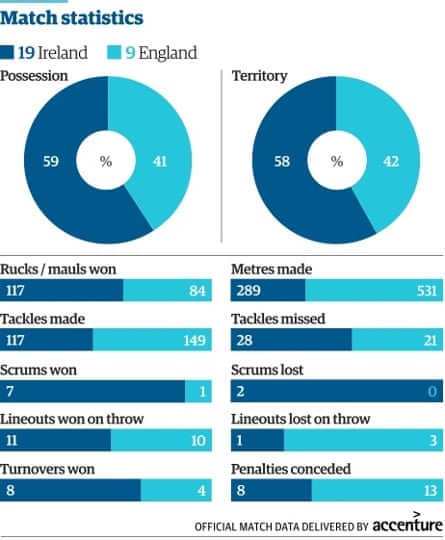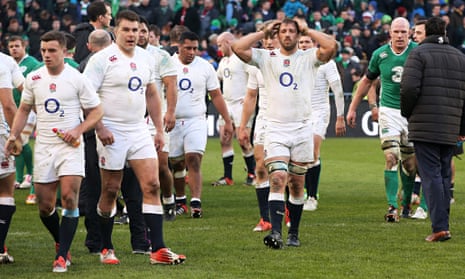The RBS 6 Nations title is still up for grabs but a number of significant questions were answered on a chilly March afternoon in Dublin. We now know for certain that Ireland are a serious team, strong enough in all departments to worry anyone.
Johnny Sexton and Conor Murray can also be formally admitted to the pantheon of half-back pairings. And England? Only truly outstanding sides win grand slams and Stuart Lancaster’s squad have fallen frustratingly short once again.
On this evidence it is hard to see any of their rivals pipping Joe Schmidt’s steely competitors to a second successive title – and more difficult still to imagine England hoisting the Rugby World Cup this autumn.
That tournament, admittedly, will not be staged on Irish soil but, just when they wanted to make a real statement, England’s composure and discipline were found wanting. Without a belated visiting rally following Sexton’s departure with a hamstring problem, the final margin would have been wider.
This was Ireland’s 10th successive Test victory, equalling their all-time record, and definitely ranking among their most satisfying. They teased and tormented the visitors aerially, hassled them into set-piece errors and, for the first hour in particular, starved them of territory and possession.
Robbie Henshaw’s 52nd-minute try in the right corner effectively ended the game as a contest, even if England did come close to scoring late on. If not quite as bad as their shellackings in 2007 and 2011, this was another distinctly painful trip across the Irish Sea for the English.
Perhaps it will help Lancaster in the long run, if only in terms of confirming what his best XV looks like. Despite the muscular endeavour of Billy Vunipola, Dave Attwood, James Haskell and Dan Cole and the early departure of a dazed Sean O’Brien, England were unable to gain any forward ascendancy and Sexton comfortably won his fly-half duel with George Ford. It was one of those days when every avenue England explored turned out to be a cul-de-sac.
At no stage was this a remotely soothing afternoon for the management. Torrential rain, hail, snow and blustery winds all swept across the city before kick-off and, while it was dry for the game, conditions were chilly and raw. Despite the pale sunshine which belatedly emerged, it was the kind of day traditionally beloved of rampaging, gap-toothed Irish wing forwards and hip-flask manufacturers.
More than anything, though, it was the perfect environment for steepling garryowens and aerial examinations. England knew they would be tested and, sure enough, the fusillade began early, Sexton and Murray both causing defensive flutters. Sexton also had two penalties safely bagged after just eight minutes as the visitors scrabbled for a legal foothold at the breakdown.

When England did finally get hold of the ball they looked much happier and a Ford drop goal rewarded a promising spell of pressure. The fly-half, however, missed a long 18th-minute penalty to level up the scores and two lost lineouts within 25 metres of the Irish line further sapped English morale.
Ireland were also playing smart, doing their best to target Ford defensively and moving the point of attack around. After Luther Burrell had been momentarily isolated in front of his own posts, Sexton – who had also been the tackler – slotted another valuable three points and England were fortunate when their persistent executioner missed with a fourth attempt following a mix-up between Ford and Anthony Watson.
The interval scoreline of 9-3, though, could have been significantly worse from a visiting perspective, given they had come from behind to defeat Wales in Cardiff only last month. They reckoned without Ireland’s desire – with Paul O’Connell inevitably in the vanguard – to end a sequence of four straight defeats to England dating back to 2011.
Sexton’s fourth penalty, after Attwood was adjudged to have impeded Murray at the back of a ruck, had an ominous feel to it.
The next score would surely be crucial and so it duly proved. With advantage already being played, Murray chipped expertly towards the corner and Henshaw rose above Alex Goode to underscore his fast-developing reputation. Sexton’s touchline conversion turned the screw, extending the home advantage to 19-3 and leaving England with a daunting amount of face to save.
To some degree they did so, without ever clicking as they did in Cardiff. Might Danny Cipriani have made a difference? We shall never know, the Sale fly-half remaining confined to the bench throughout. Richard Wigglesworth made one clever break, Ford chipped over a couple more penalties and Jack Nowell appeared slightly unlucky to have a late try ruled out for a forward pass but the downcast body language of the management afterwards did not deceive.
All England can hope now, title-wise, is that Ireland slip up in Cardiff and Edinburgh and, in the meantime, that a return to Twickenham yields a brace of healthy victories over Scotland and France. It may yet be, however, that Wales also re-enter the reckoning and Schmidt is not the kind of coach who encourages his players to take their foot off the pedal.
When they review this contest England will have to accept they finished a comfortable second to opponents whom they may yet have to face again in a World Cup semi-final.
And yet again, as has been the case annually since 2003, there will be no grand slam. Lancaster’s men will hope to bounce back but this latest Dublin thwacking is going to sting for a while.
Ireland: Try Henshaw. Con Sexton. Pens Sexton 4.
England: Pens Ford 2. Drop goal Ford.
Referee: C Joubert (SA). Attendance 51,700.

Comments (…)
Sign in or create your Guardian account to join the discussion